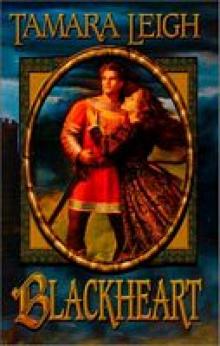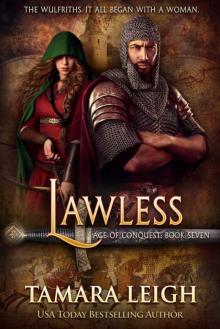- Home
- Tamara Leigh
LAWLESS: A Medieval Romance (AGE OF CONQUEST Book 7) Page 21
LAWLESS: A Medieval Romance (AGE OF CONQUEST Book 7) Read online
Page 21
“Heavenly Father, the causeway looks a snake,” the woman muttered.
It did, those on the boats who held back its farthermost sections having released them, causing what resembled a tail to uncurl toward the isle as hooves began clattering over the floating bridge that steadily straightened.
Soon it would be near enough the resistance could attack it as done the first causeway—had they time, and that seemed unlikely with the cavalry more rapidly advancing. For their enemies, conscripted Fenlanders had built a structure of greater stability than its predecessor.
Insides beginning to crumple in anticipation of Normans reaching Ely and cutting down all who came against them, Vilda yelped when the resistance began hurtling rocks and tree stumps from behind cover of trees. More went in the water than landed on the causeway, but the ones that found their mark caused the structure to shudder and sway and the Normans to slow. Then the scores of rebels showing themselves above and between the shoreline fortifications began loosing arrows.
It was then the Normans atop the towers launched their own deadly missiles across the expanse. Some fell short, some overshot, and others landed well, tempting Vilda to press hands over her eyes so she not witness the deaths of men she knew.
The counterattack did not stop Hereward’s forces from hurtling rocks and flying arrows. Though the former threatened the causeway’s stability, the latter were mostly ineffective, causing the enemy to lurch in their saddles when keen points failed to penetrate chain mail. It appeared only one found vulnerable flesh, that chevalier dropping from his horse into the water.
This being war, adjustments were made that sacrificed innocents, in this time and place those blameless ones being horses. Their unarmored bodies unable to deflect arrows, pain caused them to panic and go into the river—usually with riders astride. Still, the cavalry pressed forward, obeying orders issued by the horn.
Eyes racing back and forth to make sense of the battle, emotions flying between this shore and that, Vilda turned from the rampart when the woman beside her laughed.
“Herba?”
She who continued to play the witch, mouthing curses with arms raised, lent voice to her next words. “It goes right for our people. I wish to live, but if the resistance prevails this day, I am well with breathing my last amid Saxon superiority.”
Am I well with it? Vilda wondered. Should I die here, will I go peacefully knowing those on the isle once more escape Norman rule?
She would not, for it would not end there. Another attack would follow. And another. More would die. And more. Eventually, the Saxons might take back their country, but that hope seemed more fickle than any other.
“My work is not done, all my prayers not prayed,” Herba said and turned back, thrust her arms higher, and resumed mouthing what Le Bâtard believed curses.
Feeling those words sent heavenward, knowing more were needed as greater numbers of missiles flew from this side of the river, and from that side to those on the causeway who continued advancing despite the enemy experiencing the same horror as their predecessors, Vilda closed her eyes and added her prayers to Herba’s.
Are you yet as stone, William the Great? Guy silently seethed as he and his men in a joint effort with Maxen’s fended off attacks that evidenced Hereward had done what the king was strongly advised to do—send a sizable force to the enemy’s back, trapping them between blades and the shore.
These past days, Taillebois’ patrol had been greatly reinforced and ordered to closely watch for evidence of that strategy. However, proving they remained far from conversant with the Fens, they had not seen what the resistance did not wish seen.
Whether it was this day or another, a hundred or more rebels had slipped off the isle and lain in wait for the Normans to launch their assault. Now, dusk having surrendered to dark, commoners trained into warriors bedeviled lifelong warriors who fought to keep fire from passing through their lines and devouring the camp along with any there or on the shore beyond.
Did this particular tide not soon turn in favor of the conquerors, instead going against them as had that which a short while ago rendered the new causeway useless by way of hurtling rocks and fire that forced the warriors on it to retreat, the victory espoused by Taillebois might not merely belong to Hereward. A second Norman loss could prove more disastrous than the first. Thus, no matter how many lives and limbs were lost, the resistance could not be allowed near enough the camp to land flaming arrows or toss torches.
Hardly had Guy pulled his sword from a rebel who nearly gutted him than a Norman-accented cry for aid sounded. Though Jacques appeared in control, needing only to find a hole in his opponent’s defenses, he could not stop a second rebel lunging toward a gap with sword in one hand, a torch in the other.
Guy stopped him, though not without paying a price. Fortunately, like other blades that tasted him this night, the one that scored his jaw was not life-threatening as it would have been were the man’s swing slightly lower. And hair singed by the torch Guy ducked before coming around and slicing the rebel’s legs out from under him would grow back.
He took a moment to grind the torch beneath his boot, another to deliver a kick to the head that would silence the man’s suffering, and lunged toward the next enemy who sought to cut a path through Normans for the torch bearer coming behind.
Maxen got to him first. With a bellow and the efficiency for which he was known, he put end to him while Guy continued past and rendered the arsonist as senseless as the last.
That wave of rebels subdued the same as the others, the friends knowing more would come, they exchanged nods and turned to inventory their men who regrouped in preparation for the next attack. There was no time to count exactly how many sprawled among the grass were their own, but moonlight revealed their losses were few and Jacques had prevailed as expected.
“The towers!” someone shouted, though already Guy was looking around, the din from the shore having risen with shouts of horror in response to flames rising up around the eastern war machines. As that terrible light convulsed above the tops of tents and the elevated command post in which William would not be found since he preferred what he named the courageous heart of battle over the cowardly extremities, Guy swung his regard to the western towers.
They were not aflame, but if those who had kept the battle off Ely and brought it here were not soon put to the sword, those towers would be next and Vilda—
“Go!” Maxen said. “Our fight here is near done. All we can do is keep a way open for our fleeing warriors.”
It was true. Their men had kept fire from the camp this side, but with it beginning to rage that side, already it was eating through the foliage en route to the tents.
“You have command of my men,” Guy said. Then sheathing his sword and drawing his dagger, he ran.
Chapter Twenty-One
The archer would not relent. If he must remain aloft with his fellow Normans now launching stones at rebels on this shore who had set the eastern towers alight, the witch and her companion would remain atop theirs. And Herba would continue to call down curses.
“Silence!” the man shouted when Vilda hastened to the side and tried again to persuade him to allow Herba and her to descend the tower. “One more word, and I shall put you through.” Further he drew back the string.
He would do it. She could see it in the eye peering down the shaft and the grim of his mouth. Earlier, he might have afforded a warning by loosing an arrow near her, but with the screams of fellow Normans in burning towers traveling with the smoke across the night and several of those trapped on the platforms having jumped to their death, that shaft would be the end of her. And the next drawn from his quiver would be the end of Herba who, after praising the Lord for Hereward’s strength of leadership, had repeated she could not bear death by fire.
Vilda backed away. When she regained Herba’s side, the woman said above the sounds of battling men and heaving and crackling fire, “If he does not slay us, they will.” She jerked
her head toward those below.
Across the expanse between the sets of towers, Vilda saw the number of rebels had increased. With fire spreading into surrounding reed beds and moving toward camp, causing Normans to break formation lest it sweep through their lines, the shore was being overtaken by the resistance.
And Herba was right. Mostly unopposed, rebels were coming with fire to do here what they had done to the other towers, and likely it would not matter that Hereward’s cousin was atop this one.
Having gained the advantage, they would not risk losing it by wasting precious minutes on affording her and Herba a hasty hearing. This tower must also be destroyed, not only to prevent the enemy using it again but to provide additional fuel to sooner ruin the camp and rout Normans who would be pursued through the marsh with javelins, arrows, and more fire.
And Guy? her heart asked of her.
“See there!” Herba pointed to the tower’s lower right corner.
Hands atop the rampart, Vilda leaned out.
Unexpectedly, Sir Roul and his men were still here and, as told by drawn swords and battle cries as they rushed over ground into thickening smoke, they would defend these towers against greater numbers. And they were not alone, those who had guarded the base of the farthermost tower joining them.
“Curse, witch!” the archer shouted.
As she resumed what only Vilda knew was prayer, the enemies clashed below.
Despite the haze of smoke whose ascent made Vilda cover her mouth and nose in an attempt to filter air, it was a violent and gruesome scene. Though the enemy fell, twice as many Saxons were slain to allow those carrying torches and bundles of highly flammable material to slip through the thinning ranks of Normans.
To her tentative relief, they bypassed the cursing tower. As she followed them around to that side where once more she was directly across from the Norman who threatened Herba and her, two were felled by rocks and an arrow flown by another archer. But their sacrifice was not in vain, torches loosed from spasming hands setting the dry grass alight. Moments later, fire carried by others were applied to bundles hastily packed around the tower’s forward struts.
With flames licking at the base, panic above ensued, and those working the contraption abandoned it to reach the stairs before they became impassable.
But not the archer this side. As if he knew his fate was cast, rather than attempt to escape the mold into which he was poured, he remained.
From this vantage, Vilda could not know what had become of Sir Roul and his men, but when more rebels appeared this side, it was obvious her people yet prevailed, even if only by strength of numbers. Some carried swords, others more fire and kindling, and by their efforts at the rear of that other tower, the fleeing Normans began clambering back to the platform. Escape barred, all they could do was continue hurtling rocks and loosing arrows.
Shifting her gaze from warriors desperation had cured of arrogance, once more Vilda considered the archer and noted the taut smile he wore as he looked between Herba and her. Having remained steadfast, he was proud of himself.
But what good pride when death came for him as it came for those he would slay before allowing them to escape what he could not?
When he swung his bow right, she gasped, but the hope he would allow her and Herba to depart was flayed when he loosed an arrow and a cry turned her toward the stairs in time to glimpse a rebel falling backward, mouth gaping as he who might or might not have been coming to their aid plunged to his death.
It was no surprise another arrow was nocked and trained on Vilda. Surprise was reserved for a shriek that caused her to spin around.
Herba had stumbled back from the gap as if struck, and as Vilda moved toward her, by the light of torches made of the eastern towers and grass fires that had reached the camp, she saw a shaft protruded from the woman’s opposite shoulder. The archer behind was not responsible, rather someone on the ground, whether Norman or Saxon.
Grasping Herba’s arm, Vilda stepped in front of her. Seeing the woman’s lids were tightly closed, she confirmed the injury was to the shoulder rather than the chest and blood seeping through the fabric was not profuse.
As Vilda began drawing her to the center of the platform where she could sit without presenting an easy target, the archer bellowed. “Non! The witch curses!”
Shielding Herba with her body, Vilda drew breath across which to argue. However, the air was so tainted by smoke, her words were choked by a barking cough that bent her forward.
“Return to your place. Now!”
A hand touched Vilda’s shoulder, and as she cleared her throat, she looked into Herba’s sorrowful face.
“I can continue,” the woman said, “as I must if you are to have a chance of escape.”
“If we are to have a chance,” Vilda corrected.
She nodded as if in agreement, but it was not that. It was appeasement in the hope of returning to that gap before the miscreant killed both.
Vilda put an arm around Herba and helped her back to that place between the ramparts where she looked down upon the fallen. Was Sir Roul among them? Likely, since no Normans could be seen to oppose rebels who were making themselves scarce on this shore, doubtless to pursue and slay the scattered enemy.
“Witch!” the archer shouted, and once more Herba set to playing that role, though she could raise only one arm. In between coughs and throat clearings, her mouth moved, but so greatly she quaked, she had to be too pained to even think intelligible words.
Or so Vilda thought until she croaked, “See and hear how Normandy come unto England burns, Alvilda. Have any fires ever been as beautiful as these?”
Hearing the shouts and cries of battling, fleeing, and possibly burning men—keeping the door closed against Guy who could no more help her than she could help him—Vilda stared across her shoulder at flames sweeping through the camp. Already half was lost to the conquerors, and that which remained was doomed.
Returning her regard to Herba, she saw the woman’s head bob. Though weakening from loss of blood, she maintained the pretense.
Determined to try again with the archer who must be made to understand the injured woman could not keep her legs beneath her much longer, Vilda turned. In that instant, a great cry sounded, and she saw the fire rising up the front of that tower was outpaced by fire at the rear, those flames beginning to consume the platform where crude stairs had let onto it.
The warriors’ panic had risen to a fevered pitch, but still the archer sighted Herba, and Vilda guessed his ability to remain unmoved by the innate need for survival was the result of great hatred for Saxons. Whatever he had lost to her people, he was taking no responsibility for trespassing in a country not his own.
“Topple it!” shouted one of those trapped on the platform, and she did not understand his meaning until like boys answering the call to knock a ball around, all but her nemesis took hold of posts and rails and began pulling and pushing in an attempt to knock the tower shoreward. Doubtless, they hoped to ride it down and jump free ahead of impact. Since it might land near the water, greater their chance of survival if they gained that relatively soft landing.
The tower swayed slightly, and the stress on timber weakened by fire eating through it doubled the sound of cracking and splintering, but the archer gave no aid. Hence, what would he do if the others succeeded? Loose an arrow before the tower toppled? Or might he lose his balance, providing Vilda and Herba an opportunity to descend the stairs?
“It does no good if we do not move as one!” another Norman shouted.
There was agreement, then a count began, at the end of which all heaved, achieving greater sway and causing timbers to protest more loudly. Twice more they moved the tower, but when it settled into its new center, a sharp crack sounded and it lurched backward several feet. Not the direction they wished to go, but nearer the blazing camp.
A Norman gripped the relentless archer’s shoulder. “If we are to ride down this beast, all must work together.” When he receiv
ed no response, he barked, “Do you not see the fire has moved to the rear of that tower, that it crawls up the steps?”
Hoping he lied, Vilda started toward them, but the archer shouted, “Non!”
She stilled, and finding herself his target, watched as the other man thrust his face near. “Either put both through or leave them to burn or jump to their deaths. You are needed!”
She knew he would do the former. Blessedly, never could that be proved, the tower lurching opposite the way they wished it to go, sweeping all off their feet and causing the loosed arrow to fly above her head as shouts and cries tore from the throats of Normans. The tower would find no real center again, but neither was it destined for the camp behind. As the burning wood strained and snapped, the structure fell sideways.
Vilda screamed, certain the siege engine would land against this one. But as if dealt the backhand of a giant, it twisted and with a thunderous clap, landed behind this one.
Vilda stared at where it had been, and found her breath only when a cloud of embers billowed up and, sweeping across the platform, began biting at her flesh and lighting on her garments.
Slapping at her bodice and skirts lest the holes singed into them caught fire, she hastened forward and peered down at the toppled tower. Entirely aflame, it began feeding on this tower whose backside and stairs were already alight as told.
Had it fallen different, Vilda and Herba could have made it near enough the ground to jump the remainder of the way with few, if any, injuries. That no longer an option and having no chance of toppling this tower toward the water, they could only pray it would fall well when fire had its way with it.
“Please, Lord!” Vilda rasped and swung around. Seeing Herba had moved from the gap and was bent over the rampart, praying she was merely unconsciousness, she hastened forward.

 FEARLESS: Book Two: Age of Conquest
FEARLESS: Book Two: Age of Conquest BOUNDLESS: A Medieval Romance (AGE OF CONQUEST Book 6)
BOUNDLESS: A Medieval Romance (AGE OF CONQUEST Book 6) Lady Betrayed
Lady Betrayed Merciless
Merciless Nowhere, Carolina
Nowhere, Carolina Virgin Bride
Virgin Bride Blackheart
Blackheart Restless in Carolina
Restless in Carolina THE AWAKENING_A Medieval Romance
THE AWAKENING_A Medieval Romance Baron of Blackwood
Baron of Blackwood Leaving Carolina
Leaving Carolina HEARTLESS: A Medieval Romance (Age of Conquest Book 4)
HEARTLESS: A Medieval Romance (Age of Conquest Book 4) Baron of Godsmere
Baron of Godsmere Lady Of Eve
Lady Of Eve LAWLESS: A Medieval Romance (AGE OF CONQUEST Book 7)
LAWLESS: A Medieval Romance (AGE OF CONQUEST Book 7) Lady Of Fire AKA Pagan Bride
Lady Of Fire AKA Pagan Bride The Yielding (Age of Faith)
The Yielding (Age of Faith) The Redeeming: Book Three (Age of Faith)
The Redeeming: Book Three (Age of Faith) LADY UNDAUNTED: A Medieval Romance
LADY UNDAUNTED: A Medieval Romance THE RAVELING: A Medieval Romance (Age of Faith Book 8)
THE RAVELING: A Medieval Romance (Age of Faith Book 8) LADY EVER AFTER: A Medieval Time Travel Romance (Beyond Time Book 2)
LADY EVER AFTER: A Medieval Time Travel Romance (Beyond Time Book 2) Dreamspell
Dreamspell The Unveiling (Age of Faith)
The Unveiling (Age of Faith) THE RAVELING
THE RAVELING Splitting Harriet
Splitting Harriet Age of Faith 4 - The Kindling
Age of Faith 4 - The Kindling THE RAVELING_A Medieval Romance
THE RAVELING_A Medieval Romance Perfecting Kate
Perfecting Kate Misbegotten
Misbegotten THE VEXING: A Medieval Romance (AGE OF FAITH Book 6)
THE VEXING: A Medieval Romance (AGE OF FAITH Book 6) LadyOfConquest:SaxonBride
LadyOfConquest:SaxonBride